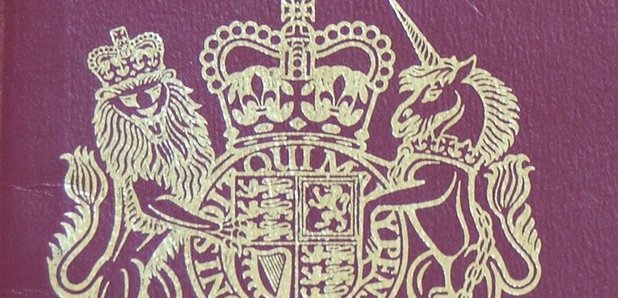
Iain Dale 7pm - 10pm
24 March 2018, 20:16 | Updated: 24 March 2018, 20:20

I just got my new passport. I'm not going anywhere but it was going to expire, so I thought I had better re-new it, just in case I win the lottery and can go on holiday, or I need proof of age when buying the lottery ticket in the first place.
Imagine my surprise when what arrived was not a handsome blue we've-got-our-country-back proper British passport, but a dark red one with the words European bloomin' Union at the top, above where it says United Kingdom of Great Britain.
Above it!
We don't want to be forced to carry pink identification, as that Tory MP Andrew Rossindale pointed out.
And it didn't make him a preposterous twit for saying that something is pink that even Stevie Wonder could tell is burgundy.
Pink is a colour with connotations, and I think that's what he was going for when he said, “The humiliation of having a pink European Union passport will now soon be over and the United Kingdom nationals can once again feel pride and self-confidence in their own nationality when travelling, just as the Swiss and Americans can do”
Andrew Rossindale, Conservative MP, is the same top-notch parliamentarian that used his time in office to table an early day motion calling for the national anthem to be played at the end of the day on BBC1, like in the good old days.
I expect he represents excellent value for money for the taxpayer – he's just the sort of fellow we need in high office, bending his considerable talents at solving the big issues of the day.
Let's leave aside the fact that if the pride of the country depends on the shade of its travel documents then we are in a very sad place indeed.
Let's also gloss over the truth that we could have had the blue colour all along; there are no rules about that in the EU. Our government chose to have burgundy, it was not a stipulation from Brussels.
The issue of the day is that the new passport printing contract did not go to a British company. The government selected a Franco-Dutch firm for the contract because it saved the British public the not insignificant amount of £120m.
Shares in the suspiciously foreign sounding De La Rue, the maker of the UK's current burgundy passports, fell after it heard the news.
The rabid right-wing press wrapped themselves in the flag and had a patriot-gasm.
The papers that are owned by off-shore trusts to reduce their tax liabilities in this country spied an opportunity to posture as the saviours of British Britain.
If they cared so much, you might think they would not go to such lengths to deprive the country of so much desperately needed tax.
It's a puzzler.
What is not puzzling is that the government was doing its duty to save the public a vast sum that could be better spent on, oh I don't know, the NHS for instance, or weapons of mass destruction.
A bad use of public funds would be to spend it on a specific business, that made £58m in profit last year, at the expense of the competition.
It would also set a dangerous precedent if they did.
Should we now subsidise every home grown company to protect it from foreign competitors?
That sounds like it would put up the prices of everything, and if the public do not support British business, why should the government do so with the public's money?
We don't buy British clothes and we don't buy British cars, or fridges or phones or stereos or televisions or computers.
We don't even buy British apples – 70% of the apples we eat are imported.
The reason we don't buy British is because we don't like what we produce and it's more expensive than the alternatives.
Why on this one thing – passports - a thing most of us will hardly ever use, do we get all jingoistic and protectionist?
I know why the press do it – that old refrain of “I love my country more than you do” sells papers and lets them claim the nationalistic, moral high ground, where their tax-avoiding owners do not belong.
The readers of those papers have no such excuse though.
We stopped buying British a long time ago and thought nothing of it.
The result is that shops closed, companies were sold overseas, businesses went bust and factories were shuttered.
It's a bit late to claim buyer's remorse and demand Britain first now.